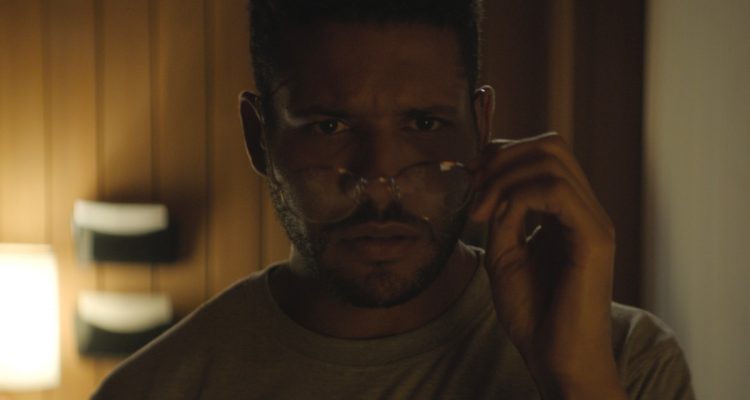Horror films have always been great carriers for social commentary. The tropes, the carnage, the acceptance that characters on screen are going to put themselves in risky situations—it all allows for the message to go down easy. Actor/producer Kurtis David Harder’s directorial debut, “Spiral,” is a solid example of the way this works, though it’s more than just a timely cultural critique. In this horror film, the horror is our history, our treatment of minorities. It’s a bold and terrifying story, but it’s told with all the usual bells and whistles, basements and attics, creaks and bangs.
“Spiral” opens with a couple necking in the backseat of a car. A pair of headlights shine on them and confirm they are both men. Before the lovers can register what is happening, three jocks approach the car with baseball bats and…well, you know the rest. The movie then jumps ahead ten years to married couple Aaron (Ari Cohen) and Malik (Jeffery Bowyer-Chapman) moving to a suburb, one with big lawns and old white folk. Also, shrines. If the license plates didn’t read “Illinois,” you might think they moved to Upstate New York, where Jordan Peele’s “Get Out” takes place, or Stepford, Connecticut, the setting of Bryan Forbes’ “The Stepford Wives.”
“Spiral” riffs on “The Stepford Wives” as Aaron makes friends with the locals in this lily-white, upper-crust community. While the town welcomes the couple with open arms, Malik can’t help but notice that the people he meets just aren’t acting right, and frankly, seem a little too interested in how the whole gay thing works. His fears materialize in small, disjointed scares: a shadow in the woods; at night, a terrible slur is spray-painted on a kitchen wall; a neighboring house performs cult rituals. In the interest of keeping you guessing, Aaron never sees the apparitions, which means Malik may be seeing things that aren’t really there.
Chapman and Cohen are terrific in roles that require a lot of levels and tempos, as the central relationship goes from loving to shaky to the final act of “Marriage Story.” In the movie’s nail-biting middle, the couple has dinner with the cult neighbors, and it’s both tense and entertaining to watch Malik scour for clues. In the study, he finds a book with a spiral-shaped symbol on it. The “religious” book is your typical “kill gays” nonsense, but when Malik reveals what he’s found, Aaron says he is being unreasonable and drives a wedge in their relationship.
Unfortunately, the movie’s genre elements don’t do much to compliment Malik’s worries. Viewers will find most the scares familiar, from creaky basements and blood-soaked attics to the standard, cult finale. The score is fine, mixing quiet synths with hair-raising music cues, which play an important part in foreshadowing where this dark, twisted narrative is going. Hint: It’s going nowhere good for Malik, the only Black guy in town.
The film derives its horror from a fear of prejudice—that the worst of us will scheme, plan, and exploit minorities for their own pleasure and strength. That fear is real. That is the genetic makeup of our country, programmed in the structure of nuclear families, each replicating the previous generation like an eternal spiral. The film and its heightened scenario is fictional, not political, but Harder forces the audience to confront eerie truths here. “In this town, in this country, it is not safe for people to stand out,” says Malik. He may be right. Harder sure seems to think so. Over the course of 90 minutes, he doesn’t do anything stylistically to make “Spiral” stand out. [C]
“Spiral” is available now on Shudder.

